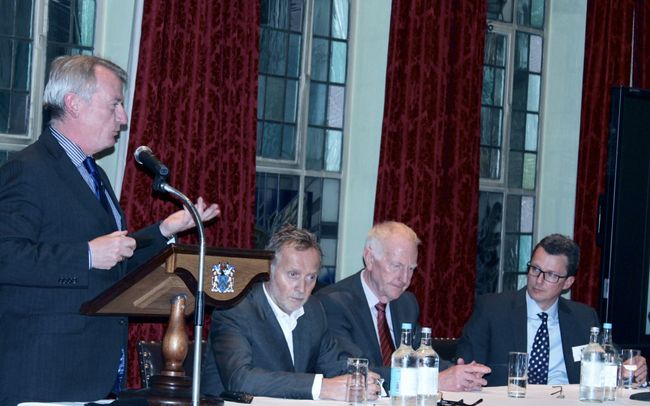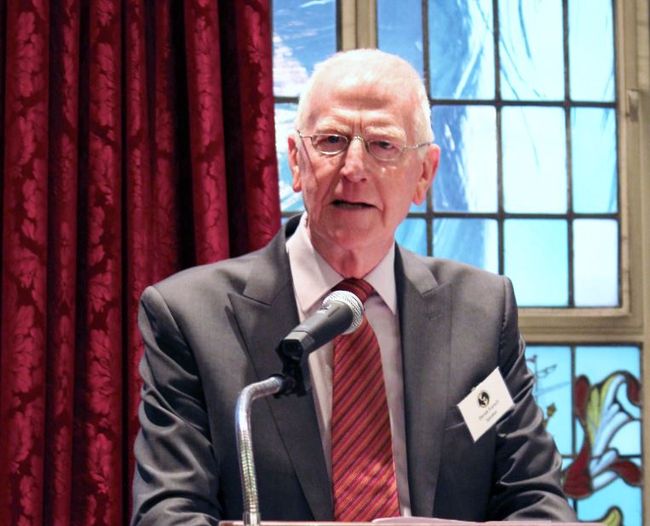
We had another fine evening at the Financial Services Club the other night, debating customer focus in banking: where is it? with a debate between:
- Owen Woodley, Managing Director, Retail Banking, Lloyds Banking Group;
- Derek French, Head of the Campaign for Community Banking Services (CCBS); and
- Anthony Thomson, co-Founder Metro Bank and Atom Bank.

Owen kicked off by talking about the irresponsibility of banks in the last decade related to risk. He made clear that banks got it wrong, bearing in mind that during this period he was developing Shawnbrook, a new UK savings and lending institution.
My own view is that what the banks got wrong was becoming retailers and have had this debate a few times before – banks pushing credit on unsuspecting punters such that they got hooked on their poisoned chalice is a line I particularly remember being used by Annie Shaw.
It is all about corporate responsibility. If banks have this money drug, and it is a drug as it unleashes access to riches, then they have to be responsible in how they handle, market and offer access to it.
Retail distribution of the money drug is the reason why banks need licences, to show they can be trusted to deal with it.
That’s where it went wrong.
That’s where PPI, rate rigging and swaps mis-selling all came from, and that’s where the banks are investing heavily today to rectify the situation.
Anyways, I digress. Owen continued to discuss the change in banking, and that the inefficiencies had been created by too much focus upon revenue seeking and not enough on risk management.

That has changed, with a shift from market share grabs to customer focus, and with a change of leadership.
You can see that at Barclays, with Antony Jenkins trimming back their investment banking operations significantly, and at Royal Bank of Scotland, where HM Treasury has pretty much told the bank to close any investment banking service.
The same is true in Lloyds.
Lloyds’ new leader, Antonio Horta-Osario, was the first to admit the PPI scandal and to stop fighting against it, much to the irritation of the industry:
Whereas Mr Daniels (Lloyds pervious CEO) fought the scandal of mis-sold payment protection plans (PPIs) with armies of lawyers and detailed debates about the Financial Services Authority's statutory powers and "principles not being actionable in law", Mr Horta-Osorio has sniffed the political wind, upped the provision the bank has made to compensate customers, and pulled out of the banking sector's joint legal action against the compensation process.
This change of attitude is now being reflected throughout the organisation and culture of Lloyds, with analysis of everything and how it appears to the customer, even the words and language being used.
It changes the way Lloyds hires, trains, manages and incentivises people, with a focus upon simplifying everything and making all clearly based upon customer focus.
Derek French didn’t agree, and posed the question as to whether customer focus really exists when a town is left without any branches of any banks, such as the 8,000 population town of Stansted?
“The Barclays chairman writes in the annual report that he is pleased they are progressing in starting to rebuild trust. The report contains the strapline that Barclays is the 'go-to bank'. Well, as the notice in their window clearly states, Stansted customers are being asked to go to either branches in Bishop's Stortford, Sawbridgeworth or Saffron Walden.”

Where do small businesses go for advice and service when there’s no bank to visit?
What happens when they need to pay in their cash at end-of-day?
Is it right to expect them to drive miles just for basic services?
And many may think that face-to-face is no longer needed for service but, for many small business which are the driving force of commerce in Britain, they are still essential.
For example, in the recent glitches, the banks have said that due to technology failures, please visit your branch. Well how can you, fi it’s shut down?
Of course, banks will not listen to the pleas to keep branches open if they are not making money and, as Anthony Thomson stated with the launch of Atom Bank: “The rate of change in mobile in particular has just been so fast that opening a bank with bank branches would be like BT putting telephone kiosks back on the high street.”
A bold statement from the man who co-founded Britain’s newest branch-based bank network, Metro Bank. But, as Anthony made clear, the case is not about branch versus digital, but about profit versus customers.
At Metro Bank, staff have no sales targets and profit is not the focus. Customers are the focus, and if you have happy customers who are advocates, the profits will follow.
That may be true, but it might not be so true with branch-based banks.
By way of example, the Telegraph reports that branches are disappearing:
Banks and building societies shut 348 branches last year – and the purge on Britain’s high streets is to intensify this week, The Telegraph can disclose. Unpublished official figures, obtained by this newspaper, show the total UK branch network fell to 11,365 by December 2012, from 11,713 a year earlier. Having paused for breath, it is understood that banks are now restarting their closure programmes.
Add this to one of the most popular blog entries of 2013: This bank branch is dead ... no it's not! It's, uh, resting ..., and we can see that customer focus is moving digital, as is Anthony.
He didn’t give away much about the plans for Atom Bank, but it’s fairly obvious that it will be different.
With no branches, no call centre and a focus upon the remote, digital interface first, it will be a new digital bank for Britain.
Add on to Atom Bank the launch of Fidor Bank UK, and we may well see something change in the next few months.
I hope so.
Chris M Skinner
Chris Skinner is best known as an independent commentator on the financial markets through his blog, TheFinanser.com, as author of the bestselling book Digital Bank, and Chair of the European networking forum the Financial Services Club. He has been voted one of the most influential people in banking by The Financial Brand (as well as one of the best blogs), a FinTech Titan (Next Bank), one of the Fintech Leaders you need to follow (City AM, Deluxe and Jax Finance), as well as one of the Top 40 most influential people in financial technology by the Wall Street Journal's Financial News. To learn more click here...

